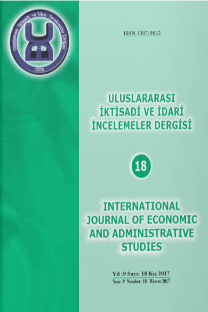TÜRKİYE’DE POLİTİK KONJONKTÜR TEORİLERİNİN ARAŞTIRILMASI: MALİYE POLİTİKASINDAN BULGULAR
Bu çalışmada Geleneksel Fırsatçı Politik Konjonktür Teorisi Türkiye ekonomisi için çeyrek yıllık kamu harcamaları, diğer kamu transfer harcamaları, vergi gelirleri ve bütçe açığı verileri kullanılarak, 1987Q12002Q4 dönemi için test edilmiştir. Analizde bu verilerin kullanılma sebebi, makroekonomik düzeydeki Geleneksel Fırsatçı Politik Konjonktür Teorisi literatüründe maliye politikası analizinde çoğunlukla bu değişkenlerin kullanılıyor olmasıdır. Bu çalışmada 1987Q1-2002Q4 döneminde yapılan genel seçimlerde, politik fırsatçı politikaların gözlenip gözlenmediğinin belirlenmesinde Alesina, Cohen and Roubini (1992)'nin OECD ve endüstriyel ülkeler için kullandıkları "Mevsimsel Box-Jenkins Modelleri" kullanılmıştır. Çalışmada elde edilen sonuçlara göre söz konusu dönemde kamu harcamaları, vergi gelirleri, diğer transfer harcamaları ve bütçe açığı verilerinde politik konjonktür dalgalanmalarına rastlanmadığından, Geleneksel Fırsatçı Politik Konjonktür Teorisi Türkiye için geçerli değildir. Bir diğer deyişle Türkiye'deki iktidar partileri 1987-2002 döneminde yeniden seçim kazanabilmek için maliye politikasını manipüle etmemişlerdir
SEARCHING FOR POLITICAL BUSINESS CYCLES IN TURKEY: FINDINGS FROM FISCAL POLICY
In this study Traditional Opportunistic Political Business Cycle Theory was tested for the Turkish economy using series of public expenditure, other public transfer expenditure, tax revenues and budget deficit for the period 1987Q1-2002Q4. The reason for the use of these variables in the analysis is that these variables have often been used in analyses for fiscal policy at the macroeconomic level in the literature of Traditional Opportunistic Political Business Cycle Theory. In the determination of whether or not political opportunistic policies were observed in general elections held in the 1987Q1-2002Q4 period, the “Seasonal BoxJenkins Models” that also used by Alesina, Cohen and Roubini (1992) for OECD countries and industrial countries was used in this study. Since the findings of the present study did not identify any political business cycles identified in other public transfer expenditure, public expenditure, tax revenue and budget deficit data, it could be concluded that Traditional Opportunist Business Cycles Theory is not valid for Turkey. In other words, government parties did not manipulate fiscal policies to win the elections in Turkey in the 1987-2002 period
___
- Alesina, A. (1987) “Macroeconomic Policy in a Two-Party System as a Repeated Game”, The Quarterly Journal of Economics, 102 (3), 651- 678.
- Alesina, A. and Roubini, N. (1990) “Political Cycles OECD Economies”, NBER Working Paper Series, Working Paper, No. 3478.
- Alesina, A. and Cohen, G. D. and Roubini, N. (1992) “Macroeconomic Policy and Elections in OECD Democracies”, Economics & Politics, 4(1), 1- 30.
- Asutay, M. (2004) “Searching for opportunistic political business cycles in Turkey”, 24th Annual Conference of the Public Choice Society, Berlin, 15- 18 April.
- Aydemir, G. (2007) “Türkiye’de Politik Konjonktür Dalgalanmaları Kapsamında Seçmen Davranışlarının Analizi (1987- 2004)”, Marmara Üniversitesi Sosyal Bilimler Enstitüsü (Yayınlanmamış Yüksek Lisans Tezi), İstanbul.
- Erdoğan, S. (2004) “Politik Konjonktür Hareketleri Teorisi Perspektifi ile SiyasetEkonomi İlişkileri”, Değişim Yayınları, İstanbul.
- Erdoğan, S. ve Bozkurt, H. (2009), “Demokratik Rejimlerde Politik Parasal Konjonktür Hareketleri: Türkiye Üzerine Ekonometrik Bir İnceleme”, Doğuş Üniversitesi Dergisi, 10 (2), 204- 216.
- Ergun, M. (2000) “Electoral Political-Business Cycles in Emerging Markets: Evidence from Turkey”, Russian and East European Finance and Trade, Vol. 36, No. 6 (Nov. – Dec.), 6- 32.
- Hızlı, H. (2012), Politik Parasal Çevrimler ve Ekonominin Kurumsal Yapısı, Hacettepe Üniversitesi Sosyal Bilimler Enstitüsü (Yayınlanmamış Doktora Tezi), Ankara.
- Hibbs, D. A. (1977), “Political Parties and Macroeconomic Policy”, The American Political Science Review, Vol. 71, No. 4, December, 1467- 1487
- Hylleberg, S., Engle, R. F., Granger, C.W.J. ve Yoo, B. S. (1990), “Seasonal Integration And Cointegration”, Journal of Econometrics, 44, 215-238.
- Kanca, O. C. (2011), “Politik Konjonktür Dalgalanmaları: Kuram ve Türkiye Örneği”, Finans Politik & Ekonomik Yorumlar, Cilt: 48, 557- 592.
- Karakaş, M. (2013), “Political Business Cycles in Turkey: A Fiscal Approach”, Yö- netim ve Ekonomi, Cilt:20 Sayı:1, 245- 262.
- Kuzu, Y. (2001), “Political Business Cycles in the Turkish Economy: 1977- 2001”, 32. Nordhaus, W. D. (1975) “The Political Business Cycle”, Review of Economic Studies, Vol.42, 169- 189.
- Nordhaus, W. D. (1990) “Alternative Approaches to the Political Business Cycles”, Brooking Papers on Economic Activity, Vol.2: 1- 68.
- McCallum, B. T. (1978) “The Political Business Cycle: An Empirical Test”, Southern Economic Journal, Vol. 44, No. 3, January, 504- 515.
- Onur, S. (2001) “Politik Konjonktür Dalgalanmaları ve Türkiye Uygulaması (1950- 2000)”, Süleyman Demirel Üniversitesi İktisadi ve İdari Bilimler Fakültesi Dergisi, Cilt 6, Sayı 2, 157- 184.
- Özatay, F. (1999) “Populist policies and the role of economic institutions in the performance of the Turkish economy”, Yapı Kredi Economic Review, 10 (1), 13-26.
- Saraç, B. T. (2005) “Politik Konjonktür Dalgalanmaları Teorileri Çerçevesinde Seçim Ekonomisi Kavramı ve (1980- 2004) Dönemi Türkiye Uygulaması”, Sel- çuk Üniversitesi Sosyal Bilimler Enstitüsü (Yayınlanmamış Yüksek Lisans Tezi), Konya.
- Sezgin, Ş. (2005) “Politika ve Ekonomi İlişkisi: Türkiye’de Politik Konjonktürel Dalgalanmalar ve Ekonomik Oy Verme”, Anadolu Üniversitesi Sosyal Bilimler Enstitüsü (Yayınlanmamış Doktora Tezi), Eskişehir.
- Telatar, F. (2001) “Politik Devresel Dalgalanmalar Işığında Demokrasi- Siyaset- Ekonomi İlişkisi: Türkiye Örneği”, İktisat, İşletme ve Finans, Ekim, Yıl: 16, Sayı 187, 57- 66.
- Tutar, İ., Tansel, A. (2000), “Political Business Cycles, Institutional Structure and Budget Deficits in Turkey”, Working Paper 2019, 1- 19.
- Yıldırım, N. (2009), Politik İş Çevrimleri: Türkiye Örneği, İstanbul Üniversitesi Sosyal Bilimler Enstitüsü Enstitüsü (Yayınlanmamış Doktora Tezi), İstanbul.
- ISSN: 1307-9832
- Yayın Aralığı: Yılda 4 Sayı
- Başlangıç: 2008
- Yayıncı: Kenan ÇELİK
